| |
"It subtly captures an immemorial quality of English rural life – the church, the local gossip, the sense of community – and that streak of native 'pluck' that people believed would see off Hitler. Its very oddness is magnificent, as though Dad's Army had suddenly morphed into a guerilla conflict of kill-or-be-killed." |
| |
The Independent, 9th July 2010 |
...which of course would have happened had the Germans invaded the British Isles. It's all very well smiling at Captain Mainwaring's and Private Pike's delightful idiocies in the 60s and 70's sitcom Dad's Army but the mere idea that these wonderful buffoons could have repelled a German invasion is utterly ridiculous. It's a scenario that Went The Day Well? takes completely seriously – and to its credit, gets absolutely right from suspicion number one. To be fair, there were twenty-six years between both projects, more than enough time to carefully introduce humour into something about as humorous as being at the business end of a bayonet thrust.
Please see Slarek's deservedly glowing DVD review of Alberto Cavalcanti's superb slice of British wartime drama, here. For the Blu-ray release, I thought I'd offer my take on a few key moments in a frequently extraordinary piece of work. This site was created to promote and push outsider, foreign and older, little known cinema to a wider audience (as well as revelling in our best loved classics). The theory is if you're reading Outsider reviews, you're already halfway convinced to search outside the limited confines of Hollywood's modern, insipid, 'narrowtive' offerings. I'm happy to be a willing reader as well as contributor. I was terrifically inspired by Slarek's review to seek out Went The Day Well? and it knocked me for six (or 'out of the park' for our Stateside readership). And due to an Extra on this disc, I'm now seeking out other films from the period – the domino effect of shared and infectious enthusiasm.
It seems odd to me that the word 'Ealing" in cinema history is absolutely synonymous with whimsy (or is that just my perception?) when this truly shocking film gets scant recognition. Having said that, Dead Of Night (1945) is a staunchly Ealing production and considerably better known. Point of trivia; Cavalcanti directed the ventriloquist's dummy segment of that original thriller, the segment that most people remember. I know it's not exactly site policy to make any judgement – critical or otherwise – on the way anyone looks or behaves in 'real life' but when I saw the following publicity shot of director Cavalcanti, I couldn't help thinking that here was the love child of John Ford and J.J. Abrams. Uncanny. Lawyers note, this is a paltry attempt at humour and not the invitation to Beverly Hill's finest to start throwing their writs out of their prams... But can you imagine "Stagecoach Lost "... Epic!
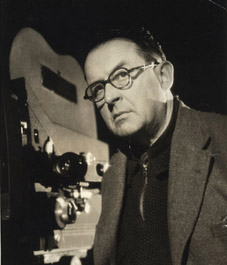
Went The Day Well? encourages audiences to accept the fundamental clichés of the commonly perceived English character. Whether they bear any truthful fruit (or indeed, fruitful truth) is up to you to decide. I find it gently ironic that the term 'stiff upper lip' is actually American in origin. The digs at the French are all (in date-context) relevant: France had surrendered to Hitler two years before the film was released. But if a patriotic sense of identity can yield some truly upstanding and moral traits, then I'm all for them. It's the insular and prejudicial side of patriotism that I find so unpleasant. If being raised in a particular country in a particular way makes you pick up a live hand grenade, leave the room and smother it with your own body to save the lives of a group of people, then all hail Englishness. This act 'redeems her class' says Simon Heffer as an argument in one of the Extras. That simple 11 second scene, beautifully edited, contains the tiniest 'mistake' which makes me love the self-sacrifice even more. When leaving the room, grenade in hand, Mrs Fraser (Marie Lohr) bumps into the doorjamb. It's such a small moment but it's so, so perfect I almost wanted to criticize it. Instead, hear my Meltchett-like roar of admiration.
When I said 'group of people' I would normally have said children but I'm hoping that we can see children as people too and not give them special significance because they haven't been on this rock as long as the grown ups. But then again, the young need some sort of defence and during WW2 the vulnerable could not have asked for a better protector than Mrs. Fraser. Using the mere word 'children' does make her sacrifice more universally acceptable. She was responsible for the lives of these little people and she did an extraordinary thing, an act foreshadowed rather subtly in earlier dialogue. Yes, a logical reading would suggest that if she had time to grab the grenade and move to another room she'd have had time to throw the bloody thing back through the window. But she didn't know this and reacted instinctively. But then 11 seconds is no time to debate such issues. The scene is shocking in a way that most post-Saw cinema could never, ever be.
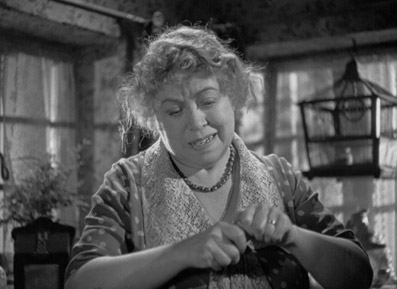
But the real shock in tone, performance and emotional reaction is courtesy of the Mrs Collins pepper pot scene. This was when Went The Day Well? slammed into third. For devotees of Chris Morris' wonderful Four Lions, this is the moment Faisal falls off the wall. Slarek referred to the Pepper Scene as having "...a directness of violence that was not only rare in war films of the period, but is made more disturbing by its domestic setting." It's the context of domesticity that certainly makes it stand out (Cavalcanti had the set built smaller than life size to increase the feeling of claustrophobia) but for me it's the performance of Muriel George that is truly shocking in the best sense. The violence, again, is foreshadowed by throwaway lines of dialogue just dripping in subtext. Have a look at this apparently harmless exchange as Mrs Collins offers one of the invaders food;
German: You're a sensible woman. You'd do better for yourself to accept the situation.
Mrs. Collins: Well, it's been a very pleasant surprise really after the way the papers have been carrying on about you Germans being fiends in human form and sticking babies on the ends of bayonets. (pause) Sugar?
German: Uh, babies on bayonets? What would be the advantage?
Mrs Collins: That's just what I say. Oh, you need the cruet. You don't look at all that sort of man to me... a regular family man I should take you for.
German: I'm not married but I have two fine sons who will soon be old enough to fight.
Mrs Collins: You don't say. Well, I'm broadminded myself and uh... and accidents will happen.
The German can't get any pepper out...
Mrs Collins: That silly pepper pot, I'll do it. I never had any children myself. Mr. Collins blamed me for it and I blamed him and then he was taken so we never found out.
Mrs. Collins throws the pepper into the German's face and shocking violence ensues.
That short dialogue exchange is an absolute wonder to me because it's nothing to do with the offer of hospitality. It's essentially a woman willing herself to be a killer, making her victim demand that she do the deed. Contained in the exchange is moral repugnance (at the man having children out of wedlock and his matter-of-fact reaction to the 'babies on bayonets' propaganda). You feel if he showed some disgust at this and pulled out photos of his girlfriend and children, Mrs. Collins may have stayed her hand. She's inviting the man to show any trace of humanity, of decency. There's also her profound loss that tips the scales. There's her own inability to have had children – subtext: this bastard has two and the death of her husband presumably in the war – subtext: this bastard also represents those who killed my man. Her "Accidents will happen," refers to the German's fathering of sons but she's already made her mind up. The Germans may not stick babies on bayonets but this one man represents the Nazi character well enough for the axe to fall. Once she's done the deed the transformation back into an ordinary housewife is simply performed (this is acting and direction firing on all cylinders). She brushes a few stray hairs back into place and then her real shock sets in. Muriel George is just superb here. Oh, let me add that all that I've said about this scene is just the first terrific part of three discrete beats. The second is suspenseful and the third is just heartbreaking.
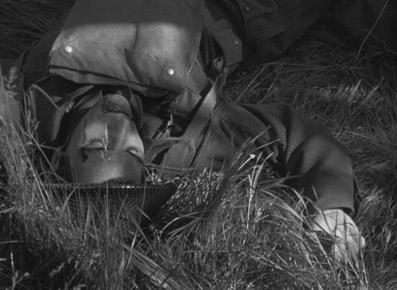
There are a few things in the film that I could carp at but almost all of them are based on the differences we now take for granted in the way films are performed or made. If you're going to see this movie – and I hope you do – then I urge you to take some of these caveats on board. In filmmaking terms 69 years is a long, long time ago. In this bygone era of cinema, there are no Peckinpah-esque blood bags exploding from bullet hits. Most of the time, a hit is 'acted' and unblemished, the victim falls dead. But Cavalcanti at least has his actors 'blood up' on a few occasions, a hand reaches to the new wound and deposits the requisite gloop. It may look stagey now but then? I have only one other tiny carp; the sound mix. There have been some extraordinary decisions made (unless the mix is incomplete rendered so by time and inattention). If there are tyre squeals forcing a bike to be run off the road, why don't the squeals continue over the shot of the boy falling in the marsh instead of harshly cutting out and cutting back in again? A truck explodes close to a soldier who throws a grenade and the sound cuts out at the cut as the soldiers nearby run past it. Could this be a creative decision? Could this be a technical limitation at the time? Surely not. The other scene that makes me consider if there is sound missing is at the battle at the end, a wounded German struggles to get to a phone in a greenhouse. He picks up the handset and then (to my mind) obviously gets another bullet for his trouble... But there's no gunshot. He acts as if he is shot for a second time but on the mix, nothing. As Alice would say...
To end positively on another detail and it's one I adore for its suggestiveness and audacity. Apart from the 'Chokolade' spelling, the major clue that alarms Nora (Valerie Taylor) is the card game scores that the Germans have been writing on a telegram that the postmistress wants back to send to the correct recipient. The continental stroke through the '7' and the long '5' tail give part of the "Blimey, they're Germans!" game away. The two players (one assumes) called a Christian name starting with A and another starting with H, make the resulting score list look as if the initials A.H. belong together. What famous Austrian owns those initials? Take a bow Adolf, you bastard. It's a small detail but it simply has to be intentional. Has to be. Alas, Alberto Cavalcanti is no longer around to tell us. Marvellous stuff.
My appreciation of Went The Day Well?, prompted by this site, grows the more I see it. The Blu-ray format brings the more senior movies into Hi-Def world and 35mm, when treated with some respect, scrubs up in quite an eye popping fashion. I was briefly a rushes projectionist in the mid 80s and still recall with great clarity my shock at seeing a first generation print off a 35mm negative. It truly startled me as we'd become accustomed to generational degradation in the cinemas. Blu-ray (while technically inferior to 35mm in terms of detail) still re-presents the older movie enabling much-loved works to be re-adored.
Well the adoration is still there but so are the scratches. You're in no doubt with the increased detail that you're looking at a high definition transfer but the double edged sword of older movie restoration means that any imperfection not spotted in standard resolution makes its rather unwelcome debut on the new format. Taking another look at the DVD, it seems as if the Blu-ray was taken from the same master. The DVD seems a lot cleaner (could that simply be due to standard definition's less detail?) though it's still plagued by hairs in the gate that conveniently disappear due to most standard TV's cut off points. With a further bit of detection, I can't confirm it's exactly the same single print (restorations traditionally rely on as many good copies as can be found) as there is some damage on the DVD that's no longer on the Blu-ray (on the back of a blouse about 06:24 from the start of the DVD). But the same main scratches in the first five minutes are present (with a lot of their relatives) on the Blu-ray. When there is a lot of the same tone of grey in the frame, the damage asserts itself (see the grey sky at about 12:01 in). Perhaps the scratches are most obvious on the starts and ends of reel changes – this would make practical sense. No matter. Once you've seen M on Blu-ray, you raise the bar rather high for older movie restorations.
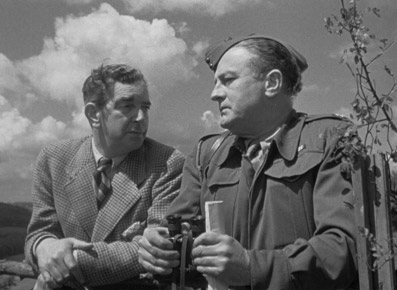 |
The condition of the source print at its best (above) and weakest (below).
The scratches in the latter are lost in the frame size reduction, but if you click
on the picture you can see the frame at full size. Take no notice of the
image blur – the frame was taken from a rapid pan shot and this
is par for the course with grabs of camera or action movement. |
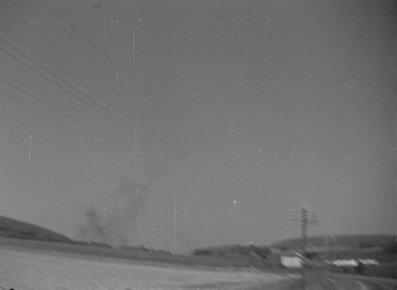 |
It's not an iceberg of complaint by any means. The contrast ratio is slightly higher than what I may regard as normal but as I like my black and white sharply black and white, that gets a big thumbs up. I love the fact that when there is black on screen I can hardly make out the frame line from the black to the left and right of a 4:3 frame. There is noticeable grain (again, the issue of how close do you sit to the screen comes up) but the detail is clear and full and the exterior shots skip with a new clarity. There is another slightly odd thing. Because it is presented in the original 1.37:1 ratio, the very edges left and right edge of frame are visible and over the front titles reveal a very slight vignette effect, something perhaps caused by the optical degradation on all film stock that's been exposed more than once for effects and titles. It doesn't look digital in origin and it in no way detracts from the viewing experience.
The re-coded mono soundtrack sounds very good. I am always surprised at how unblemished these near 70-year-old recordings are (even if some FX might be missing). The dialogue is clear and unfussy and of course all centrally located and William Walton's score, despite its age, is still pleasing – and oh so English – to the ear. There are subtitles and sound descriptions for the hard of hearing.
Sharp eyed viewers will also spot something almost mesmeric in the Blu-ray main menu page. It looks deceptively like a simple reproduction of the poster design (as I accepted while reviewing the disc) but if you really look hard, you'll find it's very, very subtly animated. Some of the characters, Captain Pugwash style, move ever so slightly within the confines of the poster art. Not all characters move (to be honest, I'm not sure how long the menu would be up before the loop started again) but those that do, do so very slowly. It's a small detail that for some bizarre reason gave me a great deal of pleasure.
BBC Radio 3 The Essay - British Cinema of the 1940s (14' 08")
Broadcast on 13th September 2010, this is a short audio essay by Simon Heffer concentrating on Went The Day Well? Some observations include "This is what Cavalcanti brought to Ealing, realism..." and "The ethos of Ealing was a socialist one." It's a fascinating slice of film journalism and a fine inclusion to a movie without a swathe of supplementary Extras to include.
Yellow Caesar (1941), a short documentary film directed by Alberto Cavalcanti (22' 30")
I pondered over the title for a while. It wasn't until I twigged the 'yellow' referred to lack of courage not skin colour that I relaxed. This is a propaganda film making Italian dictator Benito Mussolini look like a buffoon in the eyes of the British public. Subverting the man known as 'Il Duce''s own propaganda films, this was the (to be kind) 'Animal Magic' version of history with new lines overlaid on speeches and a withering, scornful voice over that encourages the Brits to treat this dangerous man as a cowardly idiot. Due to the film materials, it's sometimes not easy to differentiate between the real footage of Il Duce's march through history and the ones Cavalcanti shot just as part of the joke. But it's diverting, amusing and in 1941 I suspect it was uproarious.
With the tiniest caveat of the physical condition of the print not being entirely free from years of handling, this disc comes highly recommended. The movie, it goes without saying, is terrific and the increased detail more than worth an upgrade from a DVD and of two Extras, one inspires you to go out and find more hidden Ealing gems. The day went very well, thank you.
|